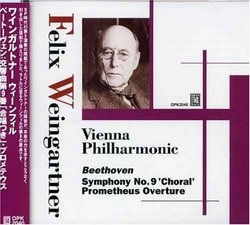| All Artists: Ludwig van Beethoven, Felix Weingartner, Rosette Anday, Vienna Philharmonic Orchestra, Luise Helletsgruber, Georg Maikl Title: Beethoven: Symphony No. 9 ("Choral"); Prometheus Overture Members Wishing: 0 Total Copies: 0 Label: Opus Kura Original Release Date: 1/1/1935 Re-Release Date: 3/25/2003 Genre: Classical Styles: Ballets & Dances, Ballets, Historical Periods, Classical (c.1770-1830), Modern, 20th, & 21st Century, Symphonies Number of Discs: 1 SwapaCD Credits: 1 UPC: 034061720409 |
Search - Ludwig van Beethoven, Felix Weingartner, Rosette Anday :: Beethoven: Symphony No. 9 ("Choral"); Prometheus Overture
 | Ludwig van Beethoven, Felix Weingartner, Rosette Anday Beethoven: Symphony No. 9 ("Choral"); Prometheus Overture Genre: Classical
|
Larger Image |
CD Details |
CD ReviewsUnbelievably even finer than the Naxos issue! Ralph J. Steinberg | New York, NY United States | 09/25/2003 (5 out of 5 stars) "One of the interesting, if sometimes frustrating, aspects of collecting CD's of historic reissues, is that there always seems to be a new label cropping up, which purports to deliver a finer transfer than its CD predesessors of the same material. Happily, here is such an example. Felix Weingartner's 1935 recording of Beethoven's Ninth Symphony, with the Vienna Philharmonic Orchestra, the Vienna State Opera Chorus, and solists Louise Helletsgruber, Rosette Anday, Georg Maikl, and Richard Mayr, is right now my favorite performance of the work. I think I have owned more transfers f this particular recording, both on LP and CD, than of any other. Most have been very poor, generally with strident highs and lack of bass. Recently, Naxos brought out an excellent issue of this recording, well-edited and balanced in sound, and inexpensive, to boot! However, curiosity got the better of me after having read a few reviews claiming the superiority of the Opus Kura transfer, so I parted with twice the price of a Naxos disc to get the present recording; I'm in no way sorry that I did. The most noticable difference between the Opus Kura and any other transfer of this Ninth is the weight of the bass. My rather dim memories of the sound of an American Columbia set from the 1940's did not prepare me for the sheer impact of the bass instruments in this recording. I can only conclude that Opus Kura's Japanese 78 rpm sources were much fuller in sound than those from America, which had been used in the Naxos issue. Being that it was Nippon Columbia who supervised Weingartner's Vienna recordings, this might explain the sonic superiority of this transfer. For the first time, the thunderous First Movement's Recapitulation really sounds like all Hell breaking loose. In addition, the Opus Kura sounds like it is more accurately pitched than other issues; 78 rpm sides were notorious for their pitch deviations. The question is, does this justify spending twice the amount one would have to shell out for the Naxos? In my opinion, yes. The Naxos edition is by no means unsatisfactory and is actually a very fine-sounding transfer from American Columbia 78's; it's just that the Opus Kura derives from sources that are more lifelike and impactful. One reviewer stated that one would not choose the Weingartner Beethoven Ninth as a first or only recording, given its less than modern sound. With the Opus Kura issue, I would strongly challenge that assertion. With regards to the performance itself, this is certainly one of the three or four really ESSENTIAL Ninths to own. The First Movement beings with ghostly, fleeting shadows gradually erupting into the grandiose main theme, the Recapitulation sounds like Hell itself, and the Coda brings forth what sounds like the endof the Universe. The Scherzo has a perfect blend of weight and mercurial fleetness, the Adagio is urgent without sounding in the least rushed, and the Finale has a fervor that few can match, especially with the radiant singing of Louise Helletsgruber, Rosette Anday, Georg Maikl, and above all, the thrilling Richard Mayr. The Weingartner "Choral" Symphony is a must for every Beethoven lover. As an aside, I would recommend every lover of this great conductor to purchase the Dover reprint of his essays "On Conducting," "On the Performance of Beethoven's Symphonies," and "Symphonic Writers After Beethoven," for a real treat of lusic and frnakly exciting musical analyses." Stupendous performance, but we're still awaiting the ideal t Barret E. Hansen | Lakewood, CA | 07/13/2006 (3 out of 5 stars) "This is a nice disc, though not as perfect as I was hoping after reading the previous review. It has rather noticeable surface noise throughout, and some passages are the worse for wear. After hearing it I got out the American Columbia 78 rpm set my parents bought new in 1939, and played many times with steel needles...and most of it actually still sounds crisper and cleaner than the Opus Kura, with much less surface noise. (An exception would be side 14, with the "Alla Marcia" section, which I played over and over when I was a kid). American Columbia (and Victor) in the 1930s made some of the finest 78 rpm pressings of all time, and I don't think the Japanese discs can compare. (Postwar American Columbias are noisier; perhaps that's what some of the other reissues used). Hopefully someone out there still has a near-mint pre-WWII copy of American Columbia Set No. 227. Meanwhile, please don't let my grousing stop you from enjoying this transcendent performance." A revelation Carlos Quintero | Caracas, Venezuela | 10/30/2009 (5 out of 5 stars) "
This is one of the most thrilling performances among historical versions of Beethoven's 9th. This is the best way to know the art of great maestro Felix Weingartner, one of the greatests conductors of all times." |

 Track Listings (5) - Disc #1
Track Listings (5) - Disc #1